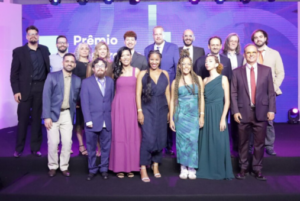Migalhas, an online news service specializing in coverage of the courts in Brazil, has acquired Congresso em Foco, one of the country’s leading and most innovative outlets dedicated to covering politics, potentially signaling a trend of consolidation of digital-native outlets.
The sale was announced in November, but the value was not disclosed due to confidentiality clauses. The agreement ensures the continuation of Congresso em Foco’s operations in their current form, including retaining its team, according to founder of Congresso em Foco, Sylvio Costa.
According to its buyer, Miguel Matos, founder of Migalhas, plans for Congresso em Foco, also known by its initials C&F, include an expansion focusing on investments in technology and video production to grow its audience. However, there are no plans to merge the operations of Congresso em Foco and Migalhas. Instead, the aim is to promote synergy in certain areas of coverage.
“Editorially, politics and the courts are interconnected, and they can optimize services, gain agility and deepen knowledge,” Matos, a journalist and lawyer, told LatAm Journalism Review (LJR). “But the goal is to maintain and significantly improve the structure. Today, C&F is 25% the size of Migalhas. The idea is for the business to grow and improve technologically. There’s more room for the political field than the judicial one.”

The sale agreement for Congresso em Foco provides for keeping the team, pictured here during the 2024 Congresso em Foco Award. (Photo: Congresso em Foco/Paulo Negreiros)
Congresso em Foco is dedicated to covering Brazil's National Congress, initially focusing on the individual performance of lawmakers—a novel approach when the website was founded in 2004. However, in recent years, the outlet has faced financial and structural challenges, partly due to increased competition in Brasília with new and better-funded outlets, Costa said.
“We needed investments in technology and skilled personnel to maintain quality,” Costa told LJR. After 20 years leading the outlet, he decided to pass the baton. “I found a buyer willing to preserve the team and values of Congresso em Foco, even with lower financial returns.”
Matos, in turn, acknowledges C&F’s strong brand and editorial independence and plans to enhance its use of videos, create more efficient sharing tools, and incorporate humor into political coverage—a hallmark of Migalhas.
“Congresso em Foco has maintained an ethical stance but needs updates in technology and usability,” Matos said. “Today, people want fast information and more agile tools.”
Vertical integration of digital media
Lucas Calil, a professor at FGV Comunicação Rio specializing in political communication, says that while Migalhas’ acquisition of Congresso em Foco doesn’t represent a market trend in Brazil, it could point to a logic of vertical integration among digital-native outlets in the country.
“It’s not a random strategy and could indicate a new logic of consolidation and vertical integration of digital portals, historically more niche-focused than the country’s major newspapers,” he told LJR.
He said the last major acquisition cycle in Brazilian media was the incorporation of financial portals by banks. One key example was the purchase of Exame, a business-focused magazine, by BTG Pactual Bank for BRL 72.3 million in 2019.
Calil also analyzed the impact of this type of acquisition on strengthening independent journalism:
“From a qualitative point of view, I welcome this type of movement precisely because, through incorporations, the new, more robust outlets end up becoming stronger in relation to themselves and in relation to the ecosystem itself – hyper-fragmentation is not synonymous with independence, as social media has taught us for more than a decade.”
20 years behind the political curtain

Sylvio Costa, founder of Congresso em Foco: “We needed investments in technology and skilled personnel to maintain quality. I found a buyer willing to preserve the team and the values of Congresso em Foco.” (Photo: Personal Archive)
With a Master’s degree in communication from the University of Westminster in London and extensive journalism experience in Brasília, Costa founded Congresso em Foco to fill a gap in legislative journalism, which, he said, was dominated by analysis that was generic or based on what happened behind the scenes.
“We wanted to show how each lawmaker voted—something at the time restricted to those with access to the steering committee,” he said.
With only four people on the initial team, Congresso em Foco started small but with big ambitions. In March 2004, it published the first list of lawmakers facing criminal charges in the Supreme Federal Court, marking a turning point in political transparency.
“We approached the 11 justices to request lists of the cases they were reporting,” Costa recounted. Between 2004 and 2006, the outlet single-handedly monitored attendance for sessions, office expenses, and other congressional activities.
A major highlight was the 2020 launch of Radar do Congresso, a free public database with detailed information about all Brazilian lawmakers, including speeches, projects, and reports. The outlet also played a crucial role in exposing scandals, such as the indiscriminate use of travel allowances by lawmakers. The report has led to savings of more than US $200 million since 2009.
The credibility it built was crucial for overcoming crises, including commercial persecution and threats during President Jair Bolsonaro’s administration. In 2018, the outlet published an editorial critical of Bolsonaro’s candidacy, which generated significant backlash, advertiser boycotts, and threats to the team.
Costa said the sale of Congresso em Foco gives him pride in fulfilling his mission and a sense of relief for securing an agreement that maintains the journalistic integrity of his creation. He plans to retire next year but doesn’t rule out exploring new projects in literature and video.
“I’m leaving Congresso em Foco debt-free, with a competent team, and immense potential to continue producing quality journalism,” he concluded.